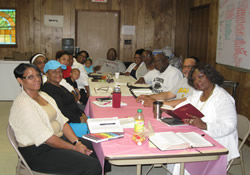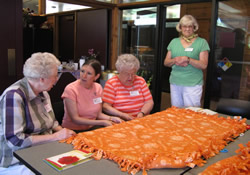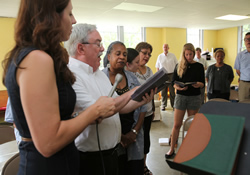
The Rev. Carolyn McCall (right) leads her 'Wacky Tuesday Bible Study'."
COURTESY PHOTO
"You all are really wacky."
The Rev. Carolyn McCall didn't expect to be naming a Bible study with those words, but that's exactly what she did with her Tuesday lunchtime gathering, now affectionately dubbed the "Wacky Tuesday Bible Study."
Now in her sixth year as pastor of the 103-member Salem United Methodist Church in Orange, Texas—on the border with Louisiana—McCall said her Bible study goes verse by verse through various books of the Bible. The conversations often take wild twists and turns, which prompted McCall to utter the now-famous phrase a few years back.
The group is composed of church members, neighborhood residents and people who drop in on their lunch hour, all between the ages of 21 and 75.
"We love studying this way," McCall said. "First, all the retired people used to sit at one table, all by themselves. But today, it's all mixed up."
Group participants, in fact, "fight" to sit at the front table. "That's where all the action is," McCall added.

Making blankets for a shelter for homeless women and children was among the activities when several generations gathered for a Women's Retreat sponsored by First United Methodist Church in Des Moines, Iowa.
INTERPRETER FILE PHOTO/CHRISTINE ANDERS
The Rev. Michael Ratliff, now associate general secretary for Young People's Ministries with the General Board of Discipleship, had a similar experience while leading a Disciple Bible study with high school youth and adults. "There were tremendous conversations that provided windows into each others' world," he said, "that changed the dynamic of that group and the relationships within it."
Intergenerational ministry is one of the core experiences the church can offer to an increasingly fragmented world, according to church experts.
"Traditionally, extended families have been a common framework for the sharing of faith, values and experiences," said the Rev. Richard Gentzler, director of Discipleship's Center on Aging and Older Adult Ministries. "Grandparents, parents and children lived together, allowing for the exchange of knowledge about family and religious traditions."
Ministries reflect families
Gentzler said that many churches are missing out on intergenerational contact. It is not always because one generation or another is missing from the congregation.
"We tend to segregate our churches, Sunday schools and various ministry programs by age, which allows each generation to see itself as separate rather than an integral part of a larger faith community," Gentzler added.
"Intergenerational ministries provide opportunities for individuals, families and congregations to once again enjoy and benefit from the richness of an age-integrated church," he said.
Ratliff agrees. "Intergenerational relationships are key to healthy lifelong faith development for young people," he said. "This is true for the health of the congregation as well. Vibrant and vital churches will only thrive where the church body is a family, and families are made up of people of all ages."
The richness of which Gentzler spoke has been part of the "Conversations over Dinner" at The University Church. The United Methodist congregation was planted in 2006 adjacent to the campus of the University of Toledo (Ohio).
According to the church's pastor, the Rev. Julian Davies, the dinner gatherings bring together a young adult population with older adults that include University Church staff and retired professionals. The purpose of the meals, which began with an intergenerational ministries grant from the denomination's Committee on Older Adult Ministries, is to discuss social issues and faith in action.
"Over a series of 'Conversations,' we had intergenerational groups re-examine the concept of what it means to be the church in the world," Davies said. As a result, four missional priorities were brought forth for the church, the church budget was realigned and new staff was hired to pursue the new direction.
Next up for "Conversations": focusing on a "Garden-to-Plate" meal concept, which Davies said will introduce participants to vegetarian and vegan-dining options based on their own community garden project, which began—you guessed it—after a previous "Conversation."

Eimy Lara (left) passes the peace with another congregant during Sunday worship at West Nashville United Methodist Church in Tennessee.
UMNS/KATHLEEN BARRY
Enriches whole church
This ministry at University Church is proof of what Gentzler says is the fruit of intergenerational ministry. "It reaches beyond the needs and interests of the individuals involved and enriches the church as a whole."
The Rev. Craig Kennet Miller would echo Gentzler and Ratliff. "A vital congregation has multiple generations active in its ministry," he said. Miller, director of pastoral leadership at the Board of Discipleship, is also co-author and editor of the recent book, Gen2Gen: Sharing Jesus across the Generations. He said that the church is unique because it offers a time and setting where, on a regular basis, all the generations come together: worship.
"That's just one reason worship is so important in a local church," Miller said. "Worship is one place where people can hear voices across the generations, from who is leading worship to the type of songs being sung."
Miller said that today's generation is, in his opinion, different from those generations growing up in the 1960s and '70s. "Today's generation hasn't learned not to trust anyone over 30," he said. "Today's generation is interested in learning from other generations."
Yes, Miller concedes, there is a "technological gap" in terms of digital technology, but that can be an avenue for learning as one generation teaches another.
"We need to recognize that different generations think differently," Miller said. They approach problems differently, and how they communicate with one another is often radically different, he said.
Sharing leadership
Those differences can make integrating a leadership team a challenge. It's among what existing congregations, which are more likely to be older, will encounter when they include younger members among their leaders as will new, younger congregations who may draw some older adults. Church leaders say it is doable—with intentional effort.

Worship can bring all generations together as it does at West End United Methodist Church in Nashville, Tenn. The Rev. Sherry Cothran Woolsey (far left) joins others in song.
UMNS/KATHLEEN BARRY
"Shared leadership begins with trusting relationships," Ratliff said. "Those relationships are developed through adults who invest in the lives of young people as Sunday school teachers, youth leaders, confirmation mentors, mission experience partners and anywhere there is opportunity to spend significant and meaningful time with each other. It also requires adult leadership willing to share positional power with those they have invested in."
"Having folks from different generations all aligned with a church's vision" is key, added Chris Wilterdink, director of young people's ministries' program development. "If young, old and in-between all share a vision of what their church is to be—then it facilitates shared leadership."
That is what Davies experiences at University Church. From the beginning, the leadership team has included people of all ages. Since adopting the goals sparked by the dinner conversations, "mission, personnel and everything flow around those four things. That worked out very well for us. We have big efforts in four different areas, and we get people of all generations involved."
Where to begin
What can churches do to strengthen—or start—their intergenerational ministry experiences?
"Start by creating an intergenerational team of persons," Gentzler said, "young and old alike. Churches fail when they 'think they know what is best' for young people rather than inviting them into the conversation and planning intergenerational ministry together."
Miller suggested that churches could also benefit from the Innovative Leadership Project, which is a dedicated seven-month process that helps churches look through their values as they grow in vitality.
"One of the key questions," Gentzler said, "is, 'How do we hear the values across the generations?'"
Missions a good beginning
A congregation's mission or outreach ministries may be a natural place to begin thinking intergenerationally.
Wanting to accomplish common goals can build "a bridge to relationship building that is challenging to create even in an intergenerational setting," Ratliff said.
"Local missions are a great opportunity, because different generations see different needs in their communities," Wilterdink added.
"Intergenerational" is one of the first words that comes to mind for Eric Buck when he thinks about Urban Cross Mission. Buck directs the St. Paul, Minn.-based ministry, sponsored by Mounds Park United Methodist Church and the Minnesota Annual Conference.
He delights that "we have adults, kids, seniors, all mixed together, working in the Mounds Park neighborhood of St. Paul." The workers, who come for all or part of a one-week mission experience in the impoverished neighborhood, do simple yard work, painting, cleaning and light repairs.
Urban Cross, according to Buck, intentionally creates intergenerational teams so that everyone gets to learn from everyone else. "We have people with different life experiences working side by side," he said. "It's a great way to build community."
The work teams, which come mainly from Minnesota, are hosted by Mounds Park Church, where they are fed and housed. "We have youth with no experience and loads of energy working with others who have lots of experience to share and diminished energy," said Buck. "We worship together, work together, eat together. We're all one big family."
Wilterdink told the story of a retired Navy person from a church he once served who wanted to assist Hurricane Katrina survivors.
"He had never been on a youth trip before 2006 when our group went to Biloxi (Miss.). He was amazed at the abilities for planning and leading that the youth had on that trip, and it inspired him to become part of a planning group that birthed young adult mission experiences" there.
"Younger generations are interested in the stories of those who have gone before," Wilterdink said. Intergenerational opportunities provide "a tremendous opportunity to learn about the past and guide congregations toward the future. Young people have a willingness to connect and a desire to put their own stamp on church life, much like today's older generations did when they were young adults."
The Rev. Erik Alsgaard is pastor of St. Ignace (Mich.) United Methodist Church and editor of the Michigan Area Reporter.
Innovative Leadership Project, www.churchleaderumc.com.
Intergenerational Programs—Faith-Based Ministries, www.gbod.org/misc/resource/intergenerational-programs-a-faith-based-possibilities1.
Gen2Gen: Sharing Jesus across the Generations, Craig K. Miller, editor, Discipleship Resources, bookstore.upperroom.org, 800-972-0433.
Ties to Tattoos, Sherri Elliott-Yeary, www.generationalguru.com, 212-802-2345.
